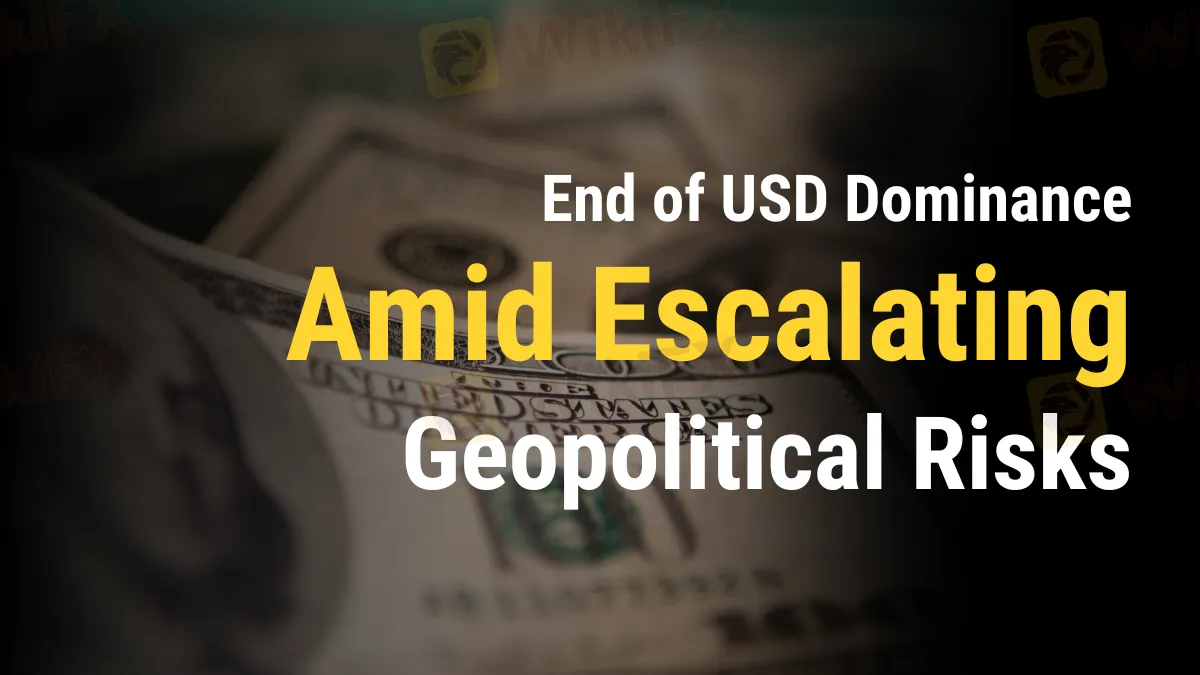简体中文
繁體中文
English
Pусский
日本語
ภาษาไทย
Tiếng Việt
Bahasa Indonesia
Español
हिन्दी
Filippiiniläinen
Français
Deutsch
Português
Türkçe
한국어
العربية
End of USD Dominance Amid Escalating Geopolitical Risks
Abstract:After Israel's retaliation, currency markets face volatility, reflecting geopolitical tensions and influencing global currency forecasts.

After Israel's retaliatory assaults on Iran, currency markets have seen heightened volatility, suggesting a potential shift in the dominant role of the US dollar.
According to recent data from the Philly Fed manufacturing survey, there was an early increase in confidence in the US currency. This aligns with the Federal Reserve's prudent monetary policy approach.
However, concerns arise over the long-term sustainability of this advancement, considering the escalating global conflicts. The 2% increase in crude oil prices highlights the market's susceptibility to geopolitical events, adding complexity to currency forecasts.
Positive and negative economic outcomes were observed in the United States before the geopolitical escalation, with concerns regarding the repercussions of a strong dollar contributing to this balance. The IMF's cautions over divergence, namely regarding significant fiscal deficits in the US relative to other advanced countries, have intensified market examination. Although the dollar demonstrates resilience against specific currencies, market sentiment suggests that this discrepancy may be subject to limitations.

Due to the disparity in interest rates between the European Union and the United States, in addition to cautious statements by ECB officials, currency forecasts have become more complicated. Subsequently, the Japanese yen initially appreciated following the reaction from Israel, indicating a more widespread avoidance of risk. However, upon closer inspection of the data from Japan, a more nuanced picture emerges due to the unexpectedly low Consumer Price Index (CPI) readings, which raise concerns about the potential presence of inflationary behaviors.
The complicated balance in global foreign exchange discussions is evident since Washington expresses no significant worry over the declining value of the yen. The correlation between geopolitical events and currency markets underscores the need for flexible policies and approaches. While an initial aversion to risk may exist, policy measures and broader economic fundamentals will ultimately determine the course of currency fluctuations.
In the current period of instability, investors must possess an all-encompassing understanding of global dynamics to identify potential opportunities amidst uncertainty.

Disclaimer:
The views in this article only represent the author's personal views, and do not constitute investment advice on this platform. This platform does not guarantee the accuracy, completeness and timeliness of the information in the article, and will not be liable for any loss caused by the use of or reliance on the information in the article.
Read more

The Ultimate Guide to Automated Forex Trading in 2025
Modern markets are revolutionized by automated trading systems, which now execute 70-85% of all transactions. These advanced automated trading software solutions, commonly called trading robots or Expert Advisors (EAs), leverage algorithmic precision for automatic trading across forex, stocks, and commodities 24/7. By removing emotional interference and executing trades in microseconds, auto forex trading platforms create fair opportunities for all market participants. For those new to automated trading for beginners, these systems provide disciplined, backtested strategies while significantly reducing manual effort.

Anti-Scam Groups Urge Tougher Action on Fraudsters in UK
Anti-scam groups demand tougher police action on fraudsters as UK fraud rates surge 19%, targeting millions in a penalty-free crime spree exposed by a $35m scam leak.

Philippines Deports 29 Indonesians Linked to Online Scam Syndicate in Manila
Online scam groups in the Philippines trick Filipinos into gambling and love scams, from Manila to Bacolod, causing trafficking and pain as police fight back.

Why does your mood hinder you from getting the maximum return from an investment?
Investment decisions are rarely made in a vacuum. Aside from the objective data and market trends, our emotions—and our overall mood—play a crucial role in shaping our financial outcomes. Whether you’re feeling overconfident after a win or anxious after a loss, these emotional states can skew your decision-making process, ultimately affecting your investment returns.
WikiFX Broker
Latest News
How Crypto Trading Transforms FX and CFD Brokerage Industry
UK would not hesitate to retaliate against US tariffs - No 10 sources
FCA Warns Against 10 Unlicensed or Clone Firms
CySEC Warns Against 14 Unlicensed Investment Websites
Top Currency Pairs to Watch for Profit This Week - March 31, 2025
Will natural disasters have an impact on the forex market?
Philippines Deports 29 Indonesians Linked to Online Scam Syndicate in Manila
Navigating the Intersection of Forex Markets, AI Technology, and Fintech
Exposed: Deceptive World of Fake Trading Gurus – Don’t Get Fooled!
AI-Powered Strategies to Improve Profits in Forex Trading
Currency Calculator







